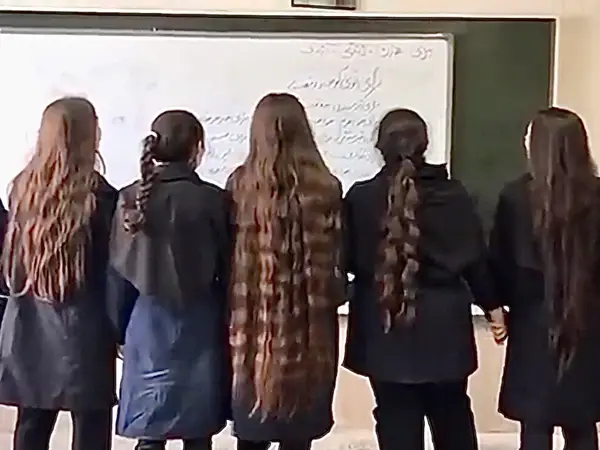An expert says antigovernment protests and strikes at Iran’s universities and schools show the regime's failure to instill its ideology in over four decades.
Azadeh Davachi, a researcher at, in an interview with Iran International November 6 said acts of protest and slogans by students since September have refuted the ideology the Islamic Republic attempted to teach youngsters throughout 43 years of its existence.
“What the Islamic Republic wanted to inculcate in students’ minds through the schoolbooks have resulted exactly in the opposite. Students remove headscarves and tear down the photos of regime leaders in classrooms. Despite so much crackdown and threats, girls enter school without hijab, chant slogans, record it using cell phones and publish the videos on social media. This means a heavy defeat of the Islamic Republic’s ideology,” underlined the pundit.
Schoolchildren in Iran kept up with daily protests on Sunday chanting slogans and staging strikes to show anger at government crackdown against older protesters.
University students insist they will go to campuses despite all the restrictions imposed but will stage strikes there and not attend classes.
Students at almost all universities in Tehran as well as in some other cities have called for sit-ins and strikes demanding the immediate release of their peers detained earlier.
Security forces have beefed up measures in recent days at campuses to search students when they enter and take away their mobile phones not to let them record videos.
Many students have been arrested since the beginning of anti-regime protests in September. Some are kidnapped by security forces, and often nobody knows their whereabout for days.
In an appalling move, Tehran University of Arts has announced that all drama graduate students will be suspended and cannot take the final exams.
However, students emphasize that they will not stop their strikes until their demands are met. Several professors have also announced that they will refuse to teach until the dismissal of students is canceled and they return to classes.
Davachi believes that the perseverance of students in holding strikes and protests 50 days into the nationwide demonstrations is of great significance, as social and civic movements in Iran have always depended on student movements.
This researcher at Deakin University of Melbourne told Iran International that an important factor differentiating this movement with previous ones is that the slogans are more radical at universities and schools.
“Student actions can strengthen other civic movements and reinforce the popular protest movement. Students’ slogans this time is very similar to those of people on the streets. Therefore, students and older protesters are somehow supporting each other,” added Davachi.
She went on to say that the demands made by students is what the youths want as they are a large group among Iran’s population.
She further noted that the clerical rulers assumed they have raised a new generation at schools who are very committed to their values, but the recent events at universities and schools proved exactly the contrary.
Women play a very significant role in the protest movement, she reiterated, saying “if the uprising of the nation against the regime proves victorious, women will not let their demands be marginalized like in the 1979 revolution and they will play a very crucial role in a free Iran.”
